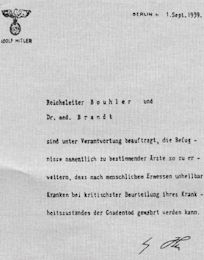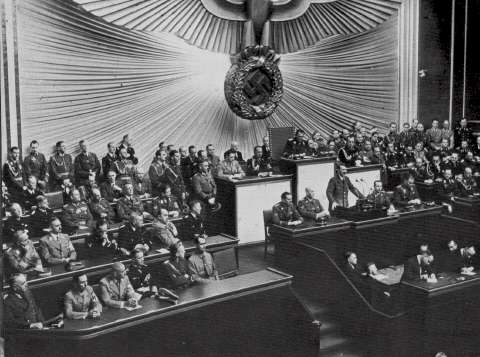
To order Wannsee House and the Holocaust ($32.50),
click here
To
order Hitler Sites ($55)
click here
From Wannsee House and the Holocaust, Chapter 6
 Hitler authorizes Reichsleiter Philipp Bouhler and Dr. Karl Brandt to empower certain doctors to euthanize the incurably ill. This document, dated September 1, 1939, is the only murder-order Hitler is known to have signed. |
There is one common misconception regarding the Holocaust. Many people believe that the final decision to destroy the Jews of Europe was taken at the Wannsee Conference. In fact, as Alan Cowell reported in the New York Times, mass murder of the Jews had begun well before the Conference.
Yet for decades, the ultimate enigma among historians of the Holocaust has been, how can anyone prove that Hitler ordered the annihilation of Europe’s Jews, and when did he do so?
Despite a half-century of research, no single document has provided evidence that Hitler gave a written order for the Holocaust. Without that crucial piece of paper, generations of historians have veered from the right-wing revisionism of David Irving of Britain, who fought to discount Hitler’s role, to a belief, embraced by American scholars like Richard Breitman and Daniel J. Goldhagen, that Hitler made the decision in early 1941-- a thesis supported by the systematic killing of Jews later that year. In contrast, the German historian Hans Mommsen has cast Hitler as a "weak dictator" and the Holocaust as the result of a horrendous bureaucratic process unfolding with its own momentum.
But now a German scholar, Christian Gerlach, has set off a debate among historians with a new and contentious theory, based on a notation by Heinrich Himmler, discovered in previously secret Soviet archives, and on other documents. The documents supposedly establish that Hitler did, indeed, make a personal decision to put to death German and all other European Jews, and announced it to his most senior Nazi followers on Dec. 12, 1941.
In addition, Gerlach argues that the decision was touched off in part by America’s entry into World War II after the Japanese attack on Pearl Harbor on Dec. 7, 1941. According to Gerlach, Hitler decided it was time to redeem a prophecy he made that a new world war would mean the annihilation of all Europe’s Jews, not just those in the Soviet Union. On January 30, 1939, the sixth anniversary of his rise to power, Hitler told the Reichstag:
|
And one more thing I would like now to state on this day memorable perhaps not only for us Germans. I have often been a prophet in my life and was generally laughed at. During my struggle for power, the Jews primarily received with laughter my prophecies that I would someday assume the leadership of the state and thereby of the entire nation and then, among many other things, achieve a solution of the Jewish problem. I suppose that meanwhile the laughter of Jewry in Germany that resounded then is probably already choking in their throats. [applause; Hitler coughs] Today I want to be a prophet again. If international finance Jewry within Europe and abroad should succeed once more in plunging the peoples into a world war, then the consequence will be not the Bolshevization of the world and therewith a victory of Jewry, but on the contrary, the destruction of the Jewish race in Europe. [applause]
|
Und eines möchte ich an diesem, vielleicht nicht nur für uns Deutsche, denkwürdigen Tag nun aussprechen: Ich bin in meinem Leben sehr oft Prophet gewesen und wurde meistens ausgelacht. In der Zeit meines Kampfes um die Macht war es in erster Linie das jüdische Volk, daß nur mit Gelächter meine Prophezeiungen hinnahm, ich würde einmal in Deutschland die Führung des Staates und damit der ganzen Nation übernehmen, und dann, unter vielen andern, auch das jüdische Problem zur Lösung bringen. Ich glaube, daß dieses damalige schallende Gelächter dem Judentum in Deutschland unterdessen wohl schon in der Kehle erstickt ist. Ich will heute wieder ein Prophet sein: Wenn es dem internationalen Finanzjudentum in und außerhalb Europas gelingen sollte, die Völker noch einmal in einen Weltkrieg zu stürzen, dann wird das Ergebnis nicht die Bolschewisierung der Erde und damit der Sieg des Judentums sein, sondern die Vernichtung der jüdischen Rasse in Europa. |
![]()
 Because some people discount Hitler's role in the Holocaust, it is
important to document his self-incriminating statements. Of these, his
January 30, 1939, Reichstag speech is strong evidence of his guilt. A recording of Hitler
giving
this speech is included here; were
it not, Hitler's defenders might simply say that Hitler never made the Reichstag
speech and that it is a complete fabrication.
Because some people discount Hitler's role in the Holocaust, it is
important to document his self-incriminating statements. Of these, his
January 30, 1939, Reichstag speech is strong evidence of his guilt. A recording of Hitler
giving
this speech is included here; were
it not, Hitler's defenders might simply say that Hitler never made the Reichstag
speech and that it is a complete fabrication.
Hitler's German is usually not easy for a non-native speaker to understand. Although born in rural Austria, Hitler spoke in public with a Bavarian accent, and he sounded similar to Adolf Wagner (1890-1944), the Gauleiter of Bavaria. Some people attribute Hitler's accent to the three years he lived in Passau, a Bavarian town, between the ages of three and six, when his speech was being formed. But Albert Speer wrote that Hitler's Bavarian accent was purely the affectation of a man who had a fondness for all things Bavarian. Indeed, Traudl Junge, Hitler's secretary, recalled that in private Hitler often spoke with a light Austrian accent and liked to use Austrian expressions.
A foreigner may understand Hitler when he speaks quietly and calmly. But when he gesticulates wildly and shouts, his diction deteriorates.
His actual words at these moments were not too important. The words were like the hackneyed libretto of an opera, which the singer does not enunciate carefully. Hitler's listeners, roused to a frenzy, knew what their Führer was bellowing, even though they did not catch every phrase. Hitler, unlike Demosthenes, had no need to rehearse with a mouthful of pebbles to perfect his diction.
Hitler's speech may be compared to that of his cronies. Hermann Göring and Rudolf Heß, for example, spoke something more akin to High German. Joseph Goebbels was outstanding in this regard. With his doctorate from Bonn, Goebbels spoke like the German professor he might have become. Even in the worst recordings, his every word is impeccably distinct.
In the section of Hitler's January 30, 1939, Reichstag speech presented here, Hitler also enunciated with unusual care. The destruction of the Jews was a subject important to him, and he undoubtedly wanted his listeners in the Kroll Opera House to catch every word. Even when he begins to shout, he is still quite understandable. Most telling, however, is the snide, threatening tone he adopts when he says, "I suppose that meanwhile the laughter of Jewry in Germany that resounded then is probably already choking in their throats." This one sentence, as Hitler delivers it, is more terrifying than most of his printed diatribes.
Launch Windows Media PlayerThis option requires Microsoft's Windows Media Player. Click here to download Windows Media Player
Launch Real Player
This option requires Real Player. Click
here to download Real Player
Hitler had not finished with this topic. In the Berlin Sportpalast, Jan 30, 1942, he had more to say:
|
It is clear to us that the war can only end with the destruction of the Germanic peoples or the disappearance of Jewry from Europe. On September 3, I already announced in the German Reichstag (and I am careful not to make rash prophecies) that this war would not develop as the Jews imagine, namely that the European-Aryan peoples will be destroyed. Instead, the result of this war will be the destruction of Jewry. For the first time others will not bleed alone. For the first time the genuine old Jewish law will be applied: "An eye for an eye, a tooth for a tooth!" And the more this war spreads, the more anti-Semitism will spread. This may be said to world Jewry. Anti-Semitism will be nourished in every prison camp, in every family which must be informed why they must sacrifice to the bitter end. And the hour will come when the most evil world enemy of all times will have played out its role for perhaps a thousand years at least. |
Wir sind uns dabei im klaren darüber, daß der
Krieg nur damit enden kann, daß entweder die germanische Völker ausgerottet
werden, oder daß das Judentum aus Europa verschwindet. Ich habe am 3.
September im Deutschen Reichstag es schon ausgesprochen -- und ich hüte
mich vor voreiligen Prophezeiungen -, daß dieser Krieg nicht so ausgehen
wird, wie es sich die Juden vorstellen, nämlich daß die europäisch-arischen
Völker ausgerottet werden, sondern daß das Ergebnis dieses Krieges die
Vernichtung des Judentums ist. Zum erstenmal werden nicht andere allein
verbluten sondern zum ersten mal wird diesesmal das echt
altjüdische Gesetz angewendet: „Aug' um Aug', Zahn um Zahn!" Und je weiter sich dieser Kampf ausbreitet, um so mehr wird sich mit diesem Kampf--das mag sich das Weltjudentum gesagt sein lassen--der Antisemitismus verbreiten. Er wird eine Nahrung finden in jedem Gefangenenlager, er wird eine Nahrung finden in jeder Familie, die aufgeklärt wird, warum sie letzten Endes ihr Opfer zu bringen hat. Und es wird die Stunde kommen, da der böseste Weltfeind aller Zeiten wenigstens vielleicht auf ein Jahrtausend seine Rolle ausgespielt haben wird. |
Launch Windows Media Player
Launch Real Player

